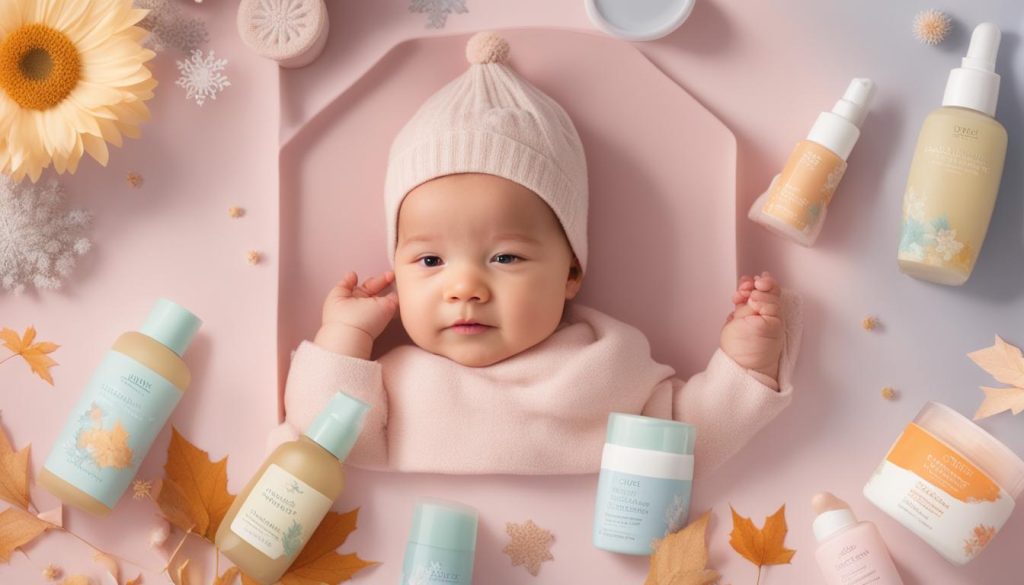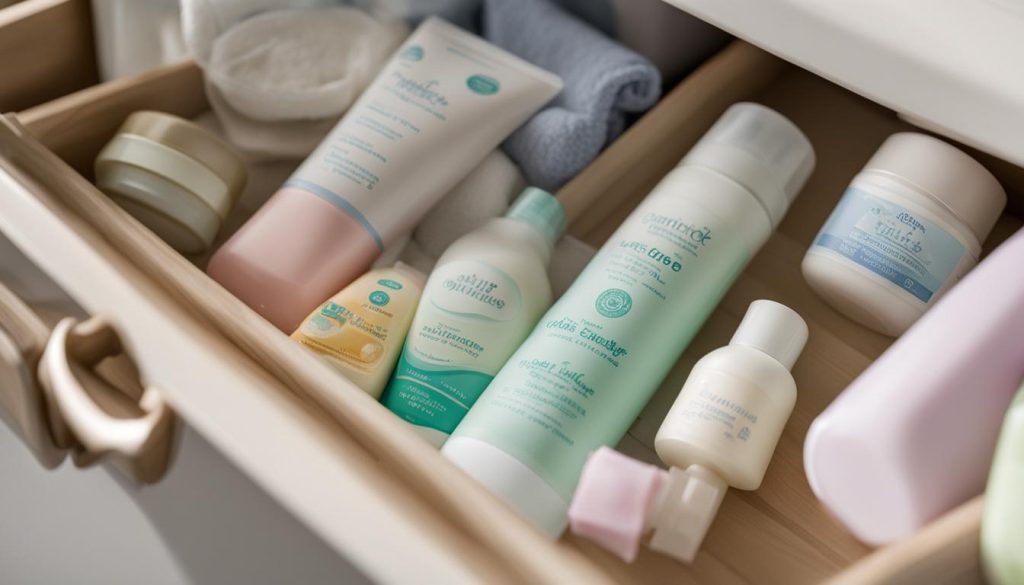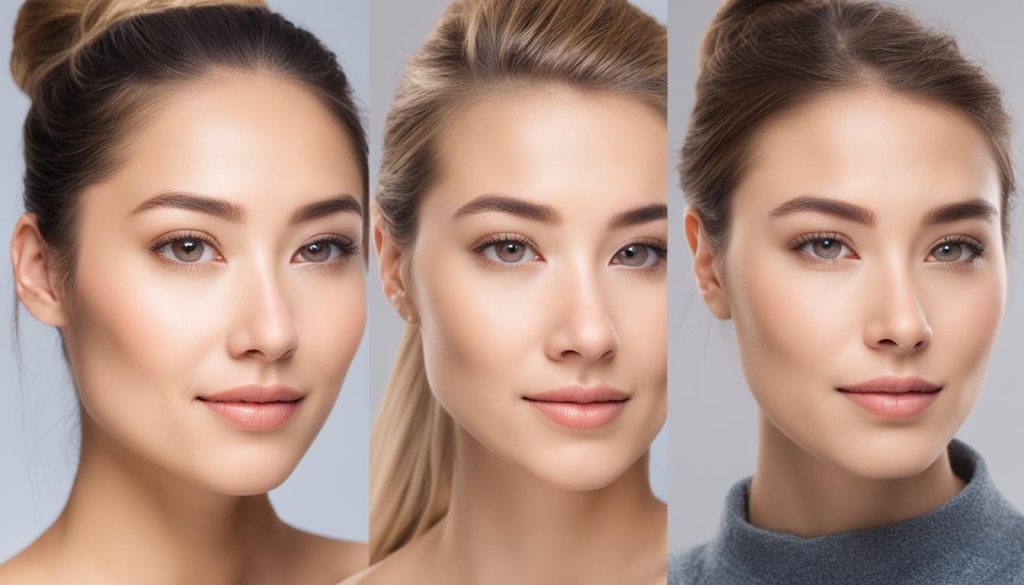As I delve into the intricacies of gentle baby skin care, my foremost intention is to enlighten parents on cultivating an environment that nurtures the soft, delicate skin of their little ones. Indeed, baby skin care products and routines are not to be selected on a whim but through informed decision-making and cautious consideration. The baby skincare routine you choose lays the foundation for your infant’s skin health, reinforcing its natural defenses against common irritations and conditions.
Turning to the best baby skin care recommendations can profoundly influence how effectively we protect and preserve the integrity of our baby’s skin. From the organic baby skin care options to the meticulously formulated lotions and cleansers, these baby skin care tips are gathered with an intent to guide conscientious caregivers along a path of gentle, nurturing care.
Whether we’re exploring baby skin care products or learning about nurturing practices, remember that the products chosen should embody safety and tenderness. Knowledge is power, particularly with gentle baby skin care, ensuring that every parent is equipped with the skills to provide the best baby skin care possible.
Baby Skin Care Tips And Guide
- Comprehend the unique requirements for nurturing baby skin care.
- Distinguish the most suitable baby skin care tips and products for your infant’s sensitive skin.
- Opt for organic baby skin care products to minimize exposure to harsh chemicals.
- Understand the importance of a consistent baby skincare routine for overall skin health.
- Ensure baby skin care products are hypoallergenic and pediatrician-approved for optimal safety.
- Stay informed on the best baby skin care practices for every developmental stage of your child.
Understanding the Unique Needs of Baby’s Skin
As someone who often guides new parents in caring for newborn skin, I understand the intricacies involved in maintaining the delicate balance required for sensitive baby skin care. The skin care of newborns isn’t merely a routine; it’s a critical aspect of overall infant hygiene and hygiene care that demands attention and knowledge. Here, I’ll delve into what makes a baby’s skin so unique and how to care for a newborn, ensuring their comfort and health.
The Delicate Nature of a Baby’s Epidermis
Newborn skin is inherently different from that of an adult; it’s considerably thinner and more delicate, which is why proper newborn hygiene is of the essence. With lesser oil glands, newborn skin is susceptible to dryness and irritation from environmental factors. To protect this fragile barrier, one must prioritize gentle handling and avoid overexposure to elements that can strip away essential moisture.
Identifying and Managing Common Baby Skin Conditions
From pesky diaper rashes to cradle cap, newborns are prone to a variety of skin conditions that can cause discomfort. Identifying these early and managing them with appropriate sensitive baby skin care techniques is vital. For example, frequent diaper changes and the use of specially designed infant hygiene products can prevent the onset of diaper rash.
Importance of Hypoallergenic and Gentle Formulations
To preserve the integrity of a baby’s epidermis, it is paramount to use hypoallergenic and gentle formulations. I advocate for baby skin care products that are free of fragrances, dyes, and harsh chemicals. These formulations respect the limited oil production and the fragile nature of infant skin, ensuring that the young one’s skin remains smooth and free from irritation.
Baby Skin Care Essentials for Daily Hygiene
As a conscientious parent, my approach to newborn hygiene entails more than routine cleaning; it’s about nurturing every layer of their skin. From the softest touch during bath time to consistent care to prevent diaper irritation, each step is crucial for maintaining the health and comfort of my baby’s delicate skin. Here are some insights into the daily essentials of infant skincare and best practices to clean a newborn effectively.
The Do’s and Don’ts of Bathing Your Newborn
Bathing a newborn is not just about cleanliness; it’s a delicate ritual. To ensure my baby’s skin stays healthy and resilient, I adhere to a few key principles:
- Use lukewarm water to avoid shocking their sensitive skin.
- Select tear-free baby skin products that cleanse without stripping the skin of its natural oils.
- Remember to gently pat their skin dry, focusing on folds and creases where moisture can hide.
It’s essential to bathe my newborn sparingly to prevent over-drying and to always be thorough yet gentle during each step.
Steps to Prevent and Treat Diaper Rash
Diaper rash can be a distressing issue, but timely actions can prevent its onset. I make it a priority to:
- Change diapers frequently to keep my baby’s skin dry and clean.
- Clean the diaper area with gentle wipes or a soft cloth dampened with water.
- Use a protective barrier cream to defend against irritants and moisture.
With regular care and the right baby skin products, I’ve found that most diaper rash concerns can be kept at bay, ensuring my baby remains happy and comfortable.
Moisturizing Techniques for Supple Baby Skin
After bathing, moisturizing is a step I never skip. Applying a hypoallergenic lotion or oil fortifies my baby’s skin barrier and locks in moisture, providing all-day comfort. Here’s my routine:
- Choose a fragrance-free moisturizer formulated for sensitive baby skin.
- Gently massage the lotion or oil into my baby’s skin, creating a bonding experience and aiding their relaxation.
- Be attentive to the dryer areas, such as elbows and knees, and reapply as needed.
Integrating these moisturizing techniques into our daily routine supports my infant’s skin hydration and keeps their skin feeling soft and supple.
How to Select Baby Skin Care Products
When I embark on the journey to find the perfect natural baby skin care solutions for my little one, I prioritize the safety and purity of the products I choose. It’s vital to understand the unique requirements of a baby’s skin because they need exceptionally gentle care. Therefore, my approach starts with a keen eye for organic baby skincare brands that invest in clinical testing and safe formulations.
Firstly, I always check if products are hypoallergenic and dermatologist-tested before adding them to my shopping list. This indicates that those baby skin care products have been designed with a baby’s delicate skin in mind. Another non-negotiable aspect is ensuring they are free from parabens, phthalates, and other harmful chemicals. These are the standards I believe all parents should insist upon for their infants’ health and safety.
- Seek labels that clearly state ‘Free from parabens and phthalates’.
- Consider products that are rigorously dermatologist-tested.
- Opt for items with hypoallergenic properties to reduce the risk of skin irritation.
I’ve discovered that choosing brands like Mustela, which offers Gentle Cleansing Gel and Stelatopia Emollient Cream, makes a significant difference. These baby skin care products not only gently clean and moisturize but also come with the assurance of being tested for baby’s skin health. Other products like their baby wipes, baby oil, and mineral sunscreen share similar credentials, making them ideal choices for my little one.
- Mustela’s Gentle Cleansing Gel
- Stelatopia Emollient Cream
- Nourishing baby oil
- Protective mineral sunscreen
- Refreshing baby wipes
The right selections reflect my devotion to safeguarding my baby’s skin, and I hope this guidance enables you to do the same. These steps are not just about nurturing your baby today but about investing in their long-term skin health with the purest of care.
Infant Skincare During Seasonal Changes
As we maneuver through the revolving door of seasons, I’ve come to recognize that caring for children’s skin is much akin to choosing the right attire: one must align with the climate. Allow me to delineate some seasonal specifics that ensure optimal baby skin care throughout the year.

When tossing leaves of autumn make way for the winter chill, the drop in humidity beckons for amplified hydration. It’s not just about piling on layers to keep our little ones snug; one must ponder the texture against the skin. Here’s where I prioritize soft, organic materials like cotton over potentially abrasive ones like wool.
- Heftier creams come to the fore, guarding delicate skin against the biting cold.
- For bath time, I suggest a lukewarm embrace, ensuring that the comfort of warm water doesn’t strip away necessary oils from their tender skin.
Now, as the frost thaws and flowers nod in spring, the warmer breeze calls for lighter fabrics and less cumbersome creams. This shift augurs the need for vigilance against the sun’s cheerful yet deceiving rays, especially for those over six months. For these beaming days, I employ a routine of:
- Lightweight clothing to keep skin cool and able to breathe.
- Diligent application of a pediatrician-approved sun lotion, regardless of how overcast the skies appear.
- Staying up-to-date with hydration — internally and externally — as nothing cares for children’s skin like being well-moisturized and quenched.
As I pen this guide, I’m mindfully aware of the importance these adjustments hold in caring for children’s skin. Whether leaves or snowflakes fall, the sun scorches or rain patters, the year-round scripture of baby skin care remains steady—adaptability ensconced in gentleness.
Why Organic and Natural Baby Skin Care Choices Matter
When it comes to the delicate derma of a dark skin newborn or any infant, the purity of what we apply to their skin is paramount. A natural baby skin care regimen, anchored in organic baby skincare principles, serves as an armament against potential skin woes. Here, I will explore the potent reasons why opting for natural options is not a luxury, but a necessity for the health of our little ones.
Understanding Label Ingredients to Avoid
The litany of ingredients in many mainstream skincare products can be a minefield. Forewarned is forearmed; I ensure that I’m vigilant for the absence of sulfates, parabens, phthalates, and artificial dyes, which can be especially irksome to an infant’s skincare routine. These substances can be harsh on dark skin newborns who may have a predisposition to develop irritations or allergies.
Benefits of Natural Baby Skin Care on Infants’ Health
Beyond avoiding the negative, the proactive incorporation of nature-derived ingredients such as aloe vera, chamomile, and calendula brings a therapeutic dimension to baby care. Their inherent soothing and healing properties support not just superficial relief but also promote deeper skin health. The holistic effect of these organic baby skincare components is invaluable for an infant’s overall wellbeing.
- Aloe Vera: A moisture-rich plant that gently hydrates the baby’s sensitive skin.
- Chamomile: Known for its anti-inflammatory properties, it soothes skin irritations.
- Calendula: A natural antiseptic that promotes healing of minor wounds and rashes.
By incorporating organic and natural ingredients into an infant skincare regimen, I’m not just caring for their skin at the moment; I’m investing in their long-term skin health.
Gentle Baby Skin Care Routine through the Stages
Navigating the tender journey from the newborn phase to active toddler days, my focus is always on providing the most nurturing care for my child’s skin. The delicate transition from caring for newborn skin to more robust child skin care is a gradual process, which underscores the essence of a flexible baby skin care routine. It’s vital to know precisely how to care for a newborn and adjust tactics as your baby grows, ensuring their skin remains healthy and vibrant through each stage of development.
From Newborn to Toddler: Adapting Your Approach
At the newborn stage, the skin care routine is fairly minimalistic—centered around protecting the skin’s natural barrier and preventing common newborn skin issues—whereas, in toddlerhood, the game changes. As my baby’s skin started to mature, I noticed a need for a more robust approach to handle the increased exposure to diverse environments and activities. Whether it’s the introduction of new foods that could affect skin sensitivity or the rough and tumble of playtime necessitating more vigilant skin protection, I am always attuned to the shifting needs of my child’s skin.

Maintaining Skin Health with Age-appropriate Products
Consistency is key in an infant skincare regimen, but the products I use evolve over time. I’ve found that using gentle cleansers and moisturizers suitable for an infant’s skin paves the way for a smooth transition into products formulated for older children, which may feature different ingredients to deal with the active lifestyles of toddlers. I always look for age-appropriate and skin-conducive products that maintain the integrity and healthfulness of delicate skin.
- Natural oils for newborn skin moisturization
- Alcohol-free cleansers for daily bathing
- Hypoallergenic lotions for toddlers’ active days
The baby skin care routine I have developed is a blend of love, insight, and attentiveness to my child’s evolving needs. In my experience, a proactive and patient approach to infant skincare has brought about nothing but joyful smiles and the softest hugs from my little one.
Conclusion
In reviewing the best baby skin care practices, I’ve distilled that vigilant caregiving extends beyond simple maintenance; it envelops a judicious selection of skin care products designed for the most vulnerable users. Essential to this regimen is the incorporation of hypoallergenic solutions that promise purity and safety for newborn skin care. These methods aren’t mere recommendations; they are pivotal strategies that uphold the innate delicacy of a baby’s epidermis.
My commitment to delivering baby skin care tips is anchored in fostering a healthful environment that champions skin resilience from day one. Natural ingredients play a starring role in this narrative, offering a gentle alternative to the harsh chemicals found in some skincare lines. The journey from newborn to toddler is one of constant evolution, and adapting to each developmental milestone is imperative for laying down the foundation of robust skin health.
The collective wisdom gleaned from this guide serves as an indispensable compass for new parents. The key is to embrace each phase with the knowledge that the baby skin care products and regimens chosen will significantly impact their child’s well-being. It is a tapestry woven with the threads of nurture and knowledge, providing the ultimate care package for the treasured skin of our tiniest treasures.
FAQ
What makes baby skin care different from adult skin care?
Baby skin is thinner, more sensitive, and produces fewer oils than adult skin, making it more susceptible to irritation and dryness. Therefore, it requires gentler, hypoallergenic products specifically designed for its delicate nature.
How can I identify and manage common baby skin conditions?
Common baby skin conditions include diaper rash, cradle cap, eczema, and baby acne. Identifying these conditions involves observing for redness, rashes, or dry patches. Manage them with appropriate gentle cleansers, moisturizers, and by consulting a pediatrician for severe cases.
Why should I use hypoallergenic and gentle formulations for my baby?
Hypoallergenic and gentle formulations are critical for avoiding the risk of skin irritation, allergic reactions, and for keeping the baby’s skin healthy because they’re free from harsh chemicals, fragrances, and dyes which can be harmful to a baby’s skin.
How often should I bathe my newborn?
Newborns don’t need daily baths and can be bathed 2-3 times a week. Over-bathing can strip the skin of natural oils which protect against dryness and irritation. Always use a gentle, baby-specific cleanser and tepid water.
What are effective steps to prevent and treat diaper rash?
Preventing diaper rash involves frequent diaper changes, thoroughly cleaning the diaper area during changes, and allowing the skin to dry before putting on a new diaper. Treating diaper rash can include applying a zinc oxide cream and keeping the area dry and clean.
What are some moisturizing techniques for keeping baby skin supple?
To keep baby skin supple, moisturize after baths with a fragrance-free lotion or cream suited for babies. Oils that are hypoallergenic can also be used, especially for areas prone to dryness. Always patch test new products first.
How do I choose the appropriate baby skin care products?
Look for products specifically labeled as hypoallergenic, free from parabens, phthalates, dyes, and fragrances. Brands like Mustela and California Baby offer ranges that are specifically designed with babies’ sensitive skin in mind.
How should I alter my baby’s skin care routine with the changing seasons?
In cold weather, use thicker creams to protect against dryness and dress your baby in warm, breathable layers. In warm weather, dress them in lighter clothes and use lighter lotions, while ensuring they stay hydrated and protected from the sun.
Why should I consider organic and natural baby skin care products?
Organic and natural baby skin care products often contain fewer chemicals and artificial ingredients, reducing the risk of irritation for a baby’s sensitive skin. They also frequently include beneficial natural elements like aloe vera and chamomile, which can soothe and protect the skin.
What ingredients should I avoid in baby skin care products?
Avoid products with alcohol, sulfates, artificial dyes, talc, fragrances, and parabens, as these can be harsh on a baby’s skin and potentially lead to allergic reactions or irritation.
How does baby skin care evolve from newborn to toddler phases?
As babies grow, their skin also changes. The newborn phase requires more preventative care against dryness and irritants. As they become toddlers, focus shifts to maintaining skin health, potentially using slightly stronger products adapted for more active children.
What are age-appropriate baby skin care products?
Age-appropriate baby skin care products are those formulated to match the specific needs of the child’s skin at various stages. As children age, products can be introduced based on their activity level and skin sensitivity, always ensuring they adhere to the principles of being hypoallergenic and gentle.






